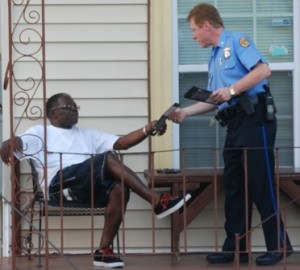By Dr. Chuck Russo and Anthony Galante, American Military University
In the first five months of 2015, there were 306 fatal police shootings in the U.S., reported The Washington Post. All law enforcement-involved shootings are preventable if officers and citizens understand one another. So what can agencies do to minimize such incidents?
It is imperative that law enforcement agencies not only train officers on proper use of force and law enforcement authority, but also work to educate community members so they have a complete understanding of what law enforcement officers can and cannot do.
Encourage Citizens to Know the Law
 Citizens must understand that law enforcement officers must follow rules, standard operating procedures, laws, and case law in order to do their job successfully. Citizens should have a working knowledge of the laws of their state, county, and municipal entities so they can reduce the likelihood of a negative encounter with an officer.
Citizens must understand that law enforcement officers must follow rules, standard operating procedures, laws, and case law in order to do their job successfully. Citizens should have a working knowledge of the laws of their state, county, and municipal entities so they can reduce the likelihood of a negative encounter with an officer.
Agencies can and should work to actively educate those in the community. Tools such as social media postings, presentations, flyers and pamphlets, and others can be used to educate and inform community members and start a dialog between all parties.
[Related Article: Excessive or Necessary? Educating the Public and Officers on Proper Use of Force]
Most citizens do not understand when a law enforcement officer has authority and when he or she does not. The unfortunate part of this very complex equation is the citizen does not know what the officer knows upon initial contact. This creates a volatile environment because the officer may have information that gives him or her the authority to stop a civilian, but that civilian does not know what the officer knows.
As a result, the civilian may not comply with the officer’s lawful commands, which will escalate the situation. Citizens must remember that the time to argue the legalities of a stop is not upon initial contact, but in the courtroom (if it escalates to that arena).
Citizens Must Take Personal Responsibility for Actions
Law enforcement officers have a duty and responsibility to protect themselves and others from death or serious bodily injury. Officers are empowered to use deadly force to prevent escape when a person poses a significant threat of death or serious bodily harm to the officer or others, known as the rules of engagement.
Citizens must take personal responsibility for their actions with police. In many officer-involved shootings, the person(s) involved could have done, or not done, something to prevent the situation from escalating to deadly force. Here are some suggestions for citizens when it comes to interacting with police:
- Don’t point a gun at a law enforcement officer or anyone else.
- Don’t point a toy gun at a law enforcement officer. Even in full sunlight during the day far too many toy guns look like real guns.
- Obey all lawful commands. The time to argue is later in a courtroom.
- Don’t approach a law enforcement officer holding a potentially deadly object. Guns, knives, box cutters, glass bottles, yard tools, bats, pieces of lumber, etc. can all cause death and/or bodily injury.
- Don’t commit a forcible felony. It can and will be argued that escape can pose a significant threat/harm to others.
- Don’t run from law enforcement. While a person may outrun a law enforcement officer, especially considering the 30-plus pounds of gear he/she may be carrying, it’s hard to outrun a radio.
- Use common sense.
It is important for police and citizens to understand one another to prevent police-involved shootings. All law enforcement agencies should work hard to educate citizens as well as maintain agency transparency in order to gain the community’s respect and support to help keep citizens safe.
About the Authors:
 Dr. Chuck Russo is the Program Director of Criminal Justice at American Military University (AMU). He began his career in law enforcement in 1987 in central Florida and was involved in all areas of patrol, training, special operations, and investigations before retiring from law enforcement in 2013. Dr. Russo continues to design and instruct courses, as well as act as a consultant for education, government and industry throughout the United States and the Middle East. His recent research and presentations focus on emerging technology and law enforcement applications, in addition to post-traumatic stress disorder (PTSD) and online learning.
Dr. Chuck Russo is the Program Director of Criminal Justice at American Military University (AMU). He began his career in law enforcement in 1987 in central Florida and was involved in all areas of patrol, training, special operations, and investigations before retiring from law enforcement in 2013. Dr. Russo continues to design and instruct courses, as well as act as a consultant for education, government and industry throughout the United States and the Middle East. His recent research and presentations focus on emerging technology and law enforcement applications, in addition to post-traumatic stress disorder (PTSD) and online learning.
 Anthony Galante is part-time faculty of Criminal Justice at American Military University A former SWAT officer and current law enforcement officer with more than 10 years of service, he holds a Masters of Aeronautical Science degree from Embry Riddle Aeronautical University as well as degrees from American Military University (MA Homeland Security 2012, MA Criminal Justice 2011). In addition to university teaching, Anthony is the Director of Training Services at the Unmanned Safety Institute, which is a strategy and technology firm delivering consulting, training, and analytics for clients in commercial industries and law enforcement seeking to integrate UAS into their daily operations. You can email him at anthony.galante9@mycampus.apus.edu.
Anthony Galante is part-time faculty of Criminal Justice at American Military University A former SWAT officer and current law enforcement officer with more than 10 years of service, he holds a Masters of Aeronautical Science degree from Embry Riddle Aeronautical University as well as degrees from American Military University (MA Homeland Security 2012, MA Criminal Justice 2011). In addition to university teaching, Anthony is the Director of Training Services at the Unmanned Safety Institute, which is a strategy and technology firm delivering consulting, training, and analytics for clients in commercial industries and law enforcement seeking to integrate UAS into their daily operations. You can email him at anthony.galante9@mycampus.apus.edu.
Comments are closed.